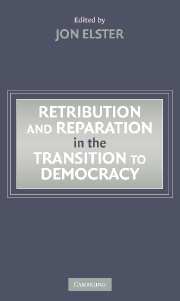Book contents
- Frontmatter
- Contents
- Contributors
- Preface and Acknowledgments
- 1 Introduction
- PART I GENERAL ISSUES
- PART II GERMANY AND GERMAN-OCCUPIED COUNTRIES AFTER 1945
- 4 Transitional Justice in Divided Germany after 1945
- 5 The Purge in France: An Incomplete Story
- 6 Political Justice in Austria and Hungary after World War II
- 7 Dealing with the Past in Scandinavia: Legal Purges and Popular Memories of Nazism and World War II in Denmark and Norway after 1945
- 8 Belgian and Dutch Purges after World War II Compared
- PART III LATIN AMERICA, POST COMMUNISM, AND SOUTH AFRICA
- Index
4 - Transitional Justice in Divided Germany after 1945
from PART II - GERMANY AND GERMAN-OCCUPIED COUNTRIES AFTER 1945
Published online by Cambridge University Press: 03 December 2009
- Frontmatter
- Contents
- Contributors
- Preface and Acknowledgments
- 1 Introduction
- PART I GENERAL ISSUES
- PART II GERMANY AND GERMAN-OCCUPIED COUNTRIES AFTER 1945
- 4 Transitional Justice in Divided Germany after 1945
- 5 The Purge in France: An Incomplete Story
- 6 Political Justice in Austria and Hungary after World War II
- 7 Dealing with the Past in Scandinavia: Legal Purges and Popular Memories of Nazism and World War II in Denmark and Norway after 1945
- 8 Belgian and Dutch Purges after World War II Compared
- PART III LATIN AMERICA, POST COMMUNISM, AND SOUTH AFRICA
- Index
Summary
The confrontation with the past in divided Germany after 1945 presents one of the most complex cases of transitional justice in the postwar period. There is first the fact that at least until 1951 the reckoning with past injustice was for the most part imposed, guided, or supervised by outside conquering powers rather than by internal forces that had overthrown the previous regime. Second, the occupying powers exercised their authority in four separate occupation zones, each with its own administration and political goals, as well as its own approach to coming to terms with the Nazi era. To complicate matters further, the judicial dimension of holding Nazi Germany to account was also pursued, more or less simultaneously, on a number of different tracks:
Through cooperative prosecution by the four occupying powers in the International Military Tribunal at Nuremberg
Through national military war crimes tribunals of all four occupying powers under Control Council Law No. 10 and national war crimes legislation
Through a variety of domestic German criminal courts operating under Allied supervision, and, later, independently
Apart from prosecuting war criminals, the occupying powers sought to purge Germany of its Nazi legacy and prepare the ground for new forms of government through a series of executive, administrative, quasi-judicial, and criminal measures involving automatic arrest, internment, loss of employment, denazification, and punishment for membership in a criminal organization. Some of these measures were carried out with the participation of German personnel or institutions; others were not.
- Type
- Chapter
- Information
- Publisher: Cambridge University PressPrint publication year: 2006
- 6
- Cited by



